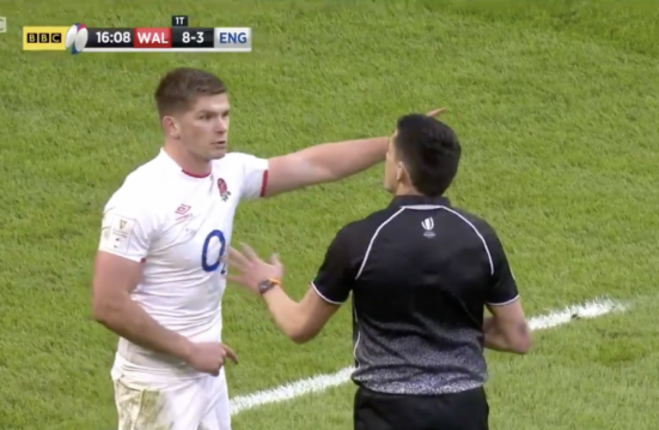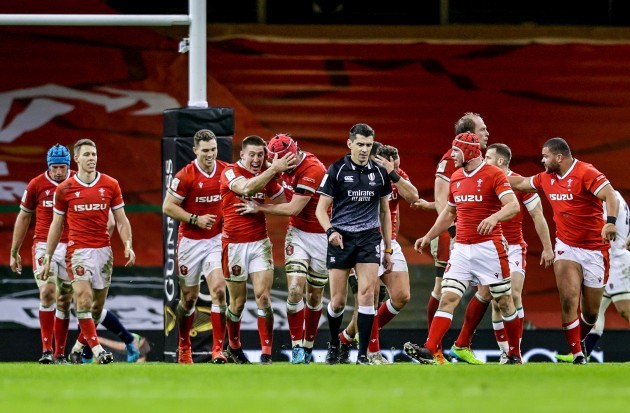PICKING THE PACK to play Scotland. Craig Casey’s nicely timed kick up the hoop to senior players. French bubbles, waffles, and guff. Extremely divergent views on a ‘home’ Lions tour. Central contracts and pressue on both players and coaches regarding ‘guaranteed’ starts. Interpro predictions. A relaxation of the ‘no b*nter rule’ to discuss initiation songs.
Thursday’s was a positively stacked Rugby Weekly pod on the back of an improved if imperfect Irish performance in Rome, and in advance of a crunch clash with the potentially ring-rusty Scots on Sunday week. Bernard Jackman, Murray Kinsella and host Gavan Casey discussed the week’s many aforementioned newslines, and also dug into Wales’ thrilling victory over England in Cardiff which unfortunately saw referee Pascal Gauzere and his team of match officials elevated to protagonistic roles as a result of their awarding two highly controversial Welsh tries.
Those decisions and their accompanying fallout, as well as TMO Romain Poite’s failure to spot a clear Irish score by Iain Henderson against Italy, prompted a discussion between Jackman, Murray and Gavan about the standard of officiating in modern rugby as well as the conspicuous deterioration of relationships between player and match official in recent years.
Notable, too, is that Joe Schmidt’s remit as World Rugby’s director of rugby and high performance was recently extended to include a focus on the improvement of officiating standards, an onus welcomed by the three lads as they revised a fairly calamitous Six Nations weekend for those adjudicators on and off the field.
Broaching the topic of officiating to begin with, Gavan said: “People will probably write to us individually on Twitter and tell us how difficult a job it is, and we’re fully aware of that; I think we’re all on the record as saying as much.
“This isn’t about criticising individual officials — it’s more so a discussion about trends in officiating across the board that, at times, is ruining not only the spectacle of the game but actually changing results at this point.
“It’s a conversation about how referees are being trained and how to better equip them to do their job properly rather than leave it go down the path that it’s on”, he added, “because you do get a collective sense that people are losing patience the more and more these types of refereeing performances are popping up — particularly in massive games like the one in Cardiff.
“So, Bernard, what does Schmidt do to address that situation?”
“Yeah, look, people might expect a ‘rant’ but I’m actually not anti-referees at all!” Jackman replied. “I just see an area of our game that’s getting further away from where it needs to be and, unfortunately, it’s being exposed now at the highest level. And I feel sorry for Pascal Gauzere.
“How I think Joe Schmidt could improve it would be to not treat referees and TMOs as being the exact same.
So, we’ve seen some referees who maybe fall out of form or want off the circuit being given TMO jobs, and I actually think they can do more harm there than they could as a touch judge or a referee. Think of referees like GPs and the TMO like a surgeon. There should be specialist TMOs. Referees only need to go them three or four times a game, but when they do they need to be absolutely right.
“There’s massive pressure on the TMO,” Jackman added. “Like, Alex Ruiz, who was the TMO for the Wales-England game, is an international referee but that doesn’t mean he’s going to be the best TMO in the world.
“That would be the one thing I think Joe Schmidt could look at as a way of helping referees. Helping them. Because it’s very difficult.”
Gavan then theorised as to why upon consultation as a group, match officials rarely disagree with each other — and in particular with the referee — even when presented with video evidence which suggests that they should, as was the case in Cardiff last weekend.
“It’s more frequent than it used to be that there’s an element of confirmation bias that sets in, groupthink if you like, where a referee might propose what they’ve seen on the field, the touch judge will agree with it, and the TMO will confirm it,” he said.
“I think one way to potentially change that is to demand that the TMO makes a recommendation first — particularly if they’ve flagged the incident — and then let the referee either agree or disagree with it rather than the other way around. Because it does now usually feel as though the referee is very much ‘the boss’ within that specific scenario, so there’s an unwillingness to question him or her at the moment.
I also think, though, that it’s perfectly natural that we find groups of officials agreeing with each other. In an era in which their performances are being scrutinised to within an inch of their lives on social media, where people have access to a lot of the human beings behind the whistle, and where there’s actual written discourse about their performances — not just internal reviews, but external, public written reviews — it’s perfectly natural for officials to feel as though they’re more under the cosh than ever and, therefore, to further unionise; to feel on some subconscious level that they have to support each other’s decisions because it probably feels like it’s them against the entire world at times.
“Definitely,” Murray replied. “The dynamic is in a strange place and I agree with you. The Louis Rees-Zammit [incident v England] is a prime example. I’d love to have been in all of their heads at that time; surely at least one of that match official team is thinking, ‘Not a hope, man — that’s clearly a knock-on,’ as most of us watching did and as everyone who has watched it back — including Gauzere — now agrees.
“It reminds me of that bit in Malcolm Gladwell’s Outliers where the plane is hurtling towards a mountain and the co-pilot is just too scared, or doesn’t want to disrespect the authority of the pilot, and they end up crashing into the mountain because they don’t say anything.
“You’re right that they don’t want to question that authority [of the referee] and that’s probably something for Joe Schmidt and the referees to work on.
And the mental skills side of it as well, like any player: there’s so much pressure in those moments, these things happen so quickly. Even for Gauzere, say, after [Dan] Biggar’s kick for [Josh] Adams’ try, he’s got a couple of seconds to think, ‘What do I do here?’ And in the end he probably says, ‘I’m just going to double down.’ That side of it, even away from the laws and the decision-making, is massive as well.
“That Josh Adams try warranted a look from the TMO,” Jackman added. “But because Gauzere doubled down with Farrell, I felt Alex Ruiz probably said to himself, ‘I better support him here’ — because it was such a confrontational discussion. And that’s what I’ve been seeing constantly for the last year and a half: the lack of respect for each other’s opinions.”
Gavan then claimed that, following Adams’ try, Gauzere had treated a protesting Farrell with a conspicuous “contempt”, and wondered if a collective reset of the player-official relationship would be required in the near future so that all relevant parties might “speak to each other like adults and not in this type of teacher-student dynamic that has crept into interactions” on the field.
“100%,” Jackman replied. “I actually saw a lot of people saying it’s not the referees’ fault, it’s Owen Farrell’s fault, it’s Johnny Sexton’s fault, et cetera.
“It doesn’t matter whose fault it is. We need to start again.”
“Last weekend is going to be the plane crash, the black box”, Jackman added, “and they’re going to have to work out a way of starting again this summer, and trying to rebuild that trust and respect — both ways.
I don’t see many captains having good relationships with referees anymore. Is it because the players don’t have the ability to build a relationship with referees or has something changed? That’s what I mean about people blaming Farrell and Sexton: show me a captain who you can see is relaxed, calm, and has a nice interchange with referees. I haven’t seen one for a while.
Murray added: “I definitely think they (the captains) do have a responsibility on the relationship side of it as well, though. I think referees are going in, particularly around those two guys, with a preconception of what it’s going to be like.
“And I can imagine it myself, first decision, ‘Aw, f– here he is, now. He’s got the scowl on the face.’ I do think those two guys in particular can be better at managing those relationships. I agree that the referees definitely have a dismissive attitude to an extent but I almost can’t blame them, in a way, for dreading refereeing those two guys.”
The42 Rugby Weekly is available every Thursday on Apple Podcasts, Spotify, or wherever you listen to yours.
Bernard Jackman, Murray Kinsella and Gavan Casey chat deteriorating player-referee relationships, perception vs reality with Ireland, initiation songs, a potential ‘home’ Lions tour, and this weekend’s interpros:
The42 Rugby Weekly / SoundCloud


